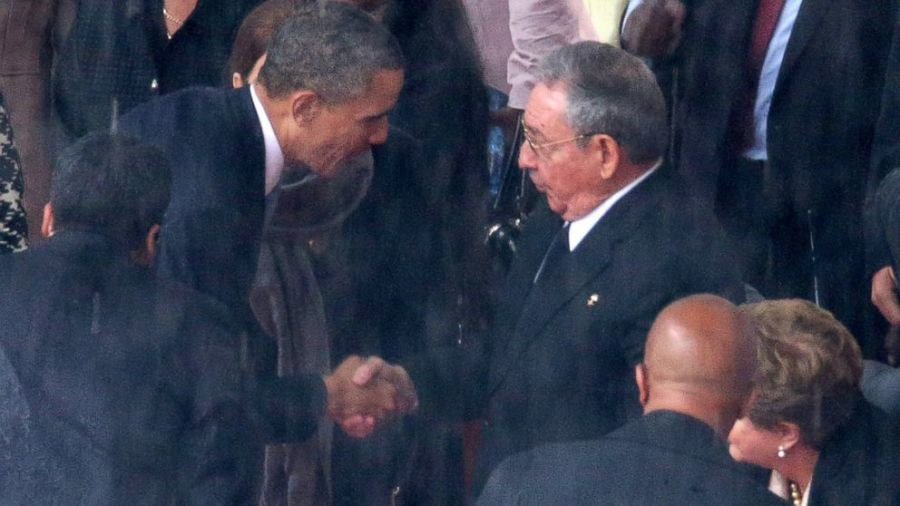U.S. and Cuba: What Does this New Diplomacy Mean?
Obama (left) and Castro (right) seen together at Nelson Mandela’s funeral. The first handshake between American and Cuban leaders in over 50 years.
December 23, 2014
On December 17, the United States and Cuba took a leap forward in reestablishing diplomatic relations. The nations are looking to improve their trade and travel policies as well as develop an alliance.
The United States began imposing embargoes in 1959 after Fidel Castro seized power and nationalized over $1 billion in American assets. More sanctions were instituted as it was discovered that Cuba had close ties with the Soviet Union, a sworn enemy of America during the 1960s. The ultimate goal of the embargoes were to force the Cuban government to become a democracy rather than maintain their communist government. However, there were other requirements that had to be met prior to the sanctions being uplifted. In the 54 years that the embargoes existed, the United States failed to achieve any of their goals for Cuba; they didn’t cause any political change and the pressure they applied on Cuba had no effect on the treatment of their citizens who are severely oppressed.
Since 1977, restrictions involving transaction and travel to and from Cuba have been lifted and reimposed as the dynamic of the relationship between the two nations changed. Espionage, the detainment of political prisoners and mutual accusations added tension to an already stressed relationship. The Cuban-American population, American politicians, the Canadian government and even religious leaders have become progressively vocal about the embargo. According to a poll conducted by the University of Florida, 7 out of 10 Cuban-Americans are in favor of reestablishing diplomatic relations with Cuba. For years, leaders of the Catholic Church such as John Paul II, Benedict XVI and Francis have encouraged discussion and diplomacy between the feuding countries. At the same time, Canada has been mediating all discussions to ensure a peaceful resolution. Their efforts are finally being recognized with the lift of the embargo.
In 2009, President Obama began working on lifting sanctions for travel between the United States and Cuba. The amended statute allowed family travel and remittance to family members. The revised policy also broadened the reach of eligible humanitarian donations as well as increased telecommunication links with the country. Obama’s work continued in 2011 when he issued a press release announcing changes being made to travel, non-family remittance and charter flights to and from Cuba. The measures were taken with the intention of increasing the flow of information and allowing Cubans to be more independent of the authorities. After 18 months of negotiations, President Obama and President Raul Castro agreed to formally restore full diplomatic relations. Some of the changes brought about by this agreement are as follows: Both countries will work toward reestablishing embassies. The U.S. will ease travel restrictions, making it easier for Americans to travel to Cuba and do business there. U.S. and Cuban banks will be allowed to start building relationships and that means American travelers will be able to use their credit and debit cards when visiting. Americans returning from a trip to Cuba can now return with up to $400 in Cuban goods, a quarter of which can be spent on alcohol and tobacco. Cuba will return 53 political prisoners to the US. Cuba will loosen its restrictions on internet access.
The revival of relations between the United States and Cuba is expected to have a positive impact on each respective country. From the first embargo being instituted in 1961, Cuba has topped over $1 trillion in economic damage. The reestablishment of trade and travel will is expected to stimulate an economic revival for the country now that they will be able to export major products to America. The United States will undoubtedly benefit from the new trading agreements as well. The removal of sanctions and promotion of free trade may promote democracy in Cuba and it would put pressure on their government to address problems that it had previously blamed on US policy.
President Obama has received praise for his efforts to lift the embargo, but he has been faced with harsh criticisms from Republican politicians, among others. Senator Marco Rubio (Florida-R) is one of the heavily opposed to the negotiation. “The White House has conceded everything, and gained little,” he said. “They gained no commitment on the part of the Cuban regime to freedom of press, or freedom of speech, or elections. No binding commitment was made to truly open up the Internet.” No commitment was made to allowing the establishment of political parties, or to even begin the semblance of a transition to democracy,” he added.
The embargo cannot be lifted with executive power alone; it will have to go to Congress, which is soon to be Republican dominated and will be faced with great opposition. A lot of confidence is being held in the plan, and the support being rallied for it may just be enough to sway Congress into voting for the lift. While a lot of work still must be done before a full lift of the embargo, the relationship between the United States and Cuba is certainly one step closer to being normalized. The increasing support for the motion suggests that a promising alliance may stem from this new diplomacy.



